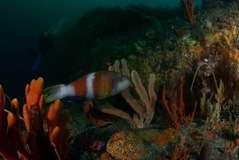Marine reserves enhance resilience to climate change

A new study, led by a University of Southampton scientist, highlights the potential for fish communities in marine reserves to resist climate change impacts better than communities on fished coasts.
The study, which is published today in the journal Nature Climate Change, involved an Australian research team from the Institute for Marine and Antarctic Studies at the University of Tasmania and the Commonwealth Scientific and Industrial Research Organisation (CSIRO) Marine and Atmospheric Research.
The researchers looked at different types of fish community responses to both short- and long-term environmental variability. They found that marine reserves have the potential to build community resilience through mechanisms that promote species and functional stability, and resist colonisation by warm water vagrants.
In addition, some ecological signals were consistently noted in both the reserve and fished sites, such as in increase in the number of herbivorous fish. Their results therefore suggest that persistent long-term warming in southeast Australia will lead to major changes in the structure and function of shallow reef fish communities.
"What I found most striking about this work," comments lead author Dr Amanda Bates from the University of Southampton, "is that marine reserves have an important role to play in understanding ecological change in the absence of fishing – the knowledge that we have gained was only possible because the long-term data on fish species were available from a marine reserve."
The authors took advantage of a two decade long data series of fish abundance from the Maria Island Marine Reserve, collected by Dr Neville Barrett and Professor Graham Edgar since 1992 with support from the Tasmanian Parks and Wildlife Service. The study focused on how the biodiversity and biological characteristics of fish communities changed in the marine reserve following a sustained period of sea warming in comparison to nearby sites open to fishing.
More information: 'Resilience and signatures of tropicalization in protected reef fish communities' Amanda E. Bates, Neville S. Barrett, Rick D. Stuart-Smith, Neil J. Holbrook, Peter A. Thompson and Graham J. Edgar, Nature Climate Change, 01 December 2013.
Journal information: Nature Climate Change
Provided by University of Southampton

















